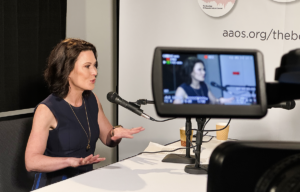Stop and LISTEN: Why EQ Is the Hidden Driver Behind Leadership Influence and Expertise
The most influential executive leaders aren’t necessarily the smartest people in the room. They’re the ones who understand emotions — their own and others’ — and leverage this understanding to drive results, build trust, and establish unshakeable credibility.
Research shows that emotional intelligence accounts for a significant portion of job performance across all industries, and the vast majority of top performers possess high emotional intelligence. For executives and leaders, EQ isn’t just a nice-to-have soft skill — it’s the foundation of influence.
At JPG, we teach you how to understand what motivates each team member and how to adapt your communication and leadership so you reach each person, audience, the board, whoever you need to move to action.
Developing executive emotional intelligence transforms good leaders into influential experts who command respect and drive meaningful change.
Build Trust with Employees and Clients Through Emotional Awareness
Trust is the currency of influence, and emotional intelligence is how you earn it. Leaders with high EQ understand that trust isn’t built through expertise alone — it’s cultivated through consistent emotional competence.
Here’s how emotionally intelligent leaders establish and maintain trust.
- Master Self-Awareness: According to Harvard Business School research, leaders with high self-awareness outperform their peers in managing their teams. When you understand your emotional triggers and responses, you can manage them before they impact your team’s perception of your stability and reliability.
- Demonstrate Consistent Emotional Regulation: High-EQ leaders don’t let stress, frustration, or pressure leak into their interactions. As executive coach Mary Olson-Menzel notes in Ragan Communications, successful leaders must “be the calmest person in the room” and practice “quiet confidence” to build their reputation as trusted advisors. This consistency creates psychological safety, encouraging team members to bring their best ideas and honest feedback.
- Show Genuine Empathy: Research published in ScienceDirect shows that emotionally intelligent leaders have the ability to empathize with their employees and exhibit individualized consideration. This aligns with expert guidance from executive coach Mary Olson-Menzel, who emphasizes the importance of being “respectful, curious and open” and meeting employees “where they are without judgment.” This isn’t about being “nice.”
Amplify Your Expertise (and Sales) Through Emotional Connection
Your technical knowledge and strategic insights are valuable, but they become truly influential when delivered with emotional intelligence. High-EQ leaders know that people don’t just buy into ideas — they buy into the person presenting them.
- Read the Room Effectively: Emotionally intelligent leaders can sense when their message isn’t landing and adjust their approach in real-time. This adaptability makes their expertise more accessible and impactful.
- Navigate Resistance with Skill: When presenting challenging ideas or driving change, high-EQ leaders anticipate emotional responses and address them proactively. They understand that resistance often stems from fear or uncertainty, not disagreement with facts.
- Create Emotional Buy-In: A study in Frontiers in Psychology found that emotionally intelligent leaders improve both behaviors and business results and have an impact on work team performance. They connect their expertise to the emotional needs and motivations of their audience, making complex concepts personally relevant.
Transform Performance Through EQ Leadership
The data is compelling: according to The Niagara Institute, employees who had managers with high emotional intelligence were four times less likely to leave than those who had managers with low emotional intelligence. This retention translates directly into influence—teams that stay together perform better and amplify their leader’s impact.
Emotionally intelligent leaders transform team performance by:
- Creating Psychological Safety: When team members and clients feel emotionally safe, they take calculated risks and buy in to the company message more fully.
- Managing Conflict Constructively: High-EQ leaders don’t avoid difficult conversations—they navigate them skillfully, turning potential discord into opportunities for growth and alignment. Executive coach Mary Olson-Menzel advises leaders to “lean in to a deeper understanding of your people to find the best way to motivate and inspire them,” recognizing that there is no “one size fits all approach to leading.”
- Building Emotional Competence Throughout the Organization: Research shows that companies that prioritize emotional intelligence training report a 20% increase in business results.
Leaders who develop their own EQ often become catalysts for organization-wide emotional intelligence development – JPG is here to help executives achieve their goals through practice.
Leverage EQ for Strategic Communication
Your ability to influence depends not just on what you communicate, but how you make people feel about what you’re communicating. As Harvard Business Review notes, “The most effective leaders are all alike in one crucial way: They all have a high degree of what has come to be known as emotional intelligence”.
Strategic emotional intelligence in communication involves several key practices that enhance a leader’s ability to connect, influence, and lead effectively.
One important aspect is timing emotional intelligence. This means knowing when to deliver difficult messages and when to give people space to process information. Leaders with high emotional intelligence recognize that timing can be the deciding factor between gaining support and meeting resistance — a skill we can teach you at JPG.
Another element is adapting communication styles. People absorb and respond to information in different ways, both emotionally and cognitively. Emotionally intelligent leaders tailor their communication approach to align with the preferences and needs of their audience, increasing clarity and impact.
Finally, strategic use of emotional contagion is a powerful tool. Emotions tend to spread, and high-EQ leaders use this to their advantage by modeling the energy, optimism, and confidence they want to see within their teams or organizations. This deliberate emotional signaling can shape team morale and drive a more positive, resilient culture.
Future-Proof Your Leadership Influence
The business landscape is evolving rapidly, and according to Aims International research, the demand for EQ skills will most likely grow by six times in the next 3-5 years. Leaders who develop high emotional intelligence now are positioning themselves for sustained influence in an increasingly complex world.
Yet here’s the challenge: a significant gap exists between the need for high EQ and the actual number of leaders who possess strong emotional intelligence. This creates a significant opportunity for leaders who commit to developing their EQ.
Develop, measure, and lead with emotional intelligence.
- Invest in Continuous EQ Development: According to PassiveSecrets research, 75% of Fortune 500 companies are already using EQ training tools, recognizing that emotional intelligence can be developed with intentional practice.
- Measure and Track Your EQ Growth: Like any executive competency, emotional intelligence improves with measurement, feedback, and deliberate practice. As executive coach Mary Olson-Menzel wisely advises, “Give yourself the space and the grace to figure it out”—it’s okay if you don’t have all the answers, and surrounding yourself with people who can help amplify your strengths is part of emotional intelligence growth.
- Build EQ Into Your Leadership Development Strategy: The most influential leaders treat emotional intelligence as seriously as they treat financial literacy or strategic planning. This includes what executive leadership expert Mary Olson-Menzel calls “empathetic and humane leadership”—embracing your natural gifts while surrounding yourself with people who complement your skillset and giving your team “the time and the space to think, learn and grow.”
Transform Your Influence: Why EQ Is Your Competitive Advantage
In a world where technical knowledge is increasingly commoditized, emotional intelligence becomes your differentiator. The leaders who understand this—who invest in developing their EQ alongside their expertise—become the voices that others follow, trust, and remember.
Your expertise gets you in the room. Your emotional intelligence makes you the person everyone in that room wants to hear from.
The data is clear: high emotional intelligence doesn’t just make you a better leader—it makes you a more influential expert whose impact extends far beyond your immediate team or organization.
Are you ready to develop the emotional intelligence that transforms expertise into influence?
Let’s work together to build your executive EQ at JPG and help you drive your success and that of your company.





